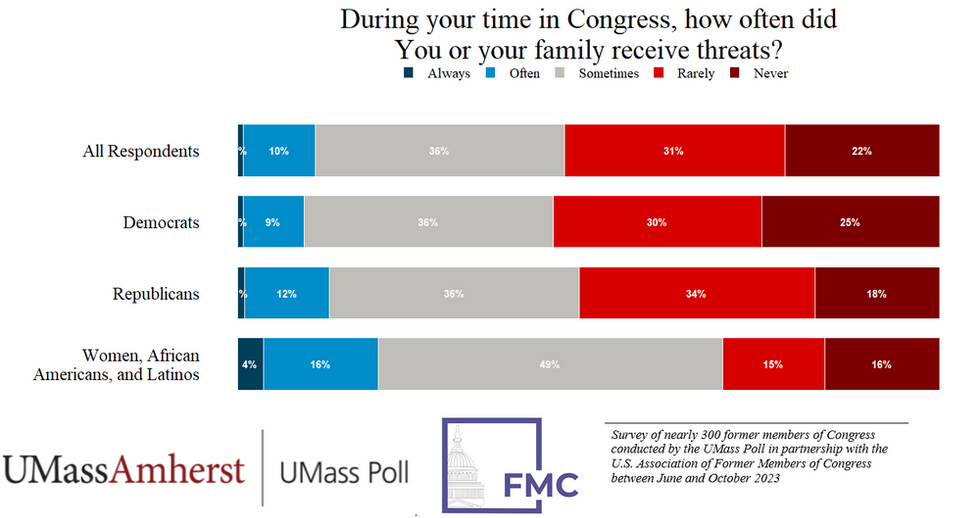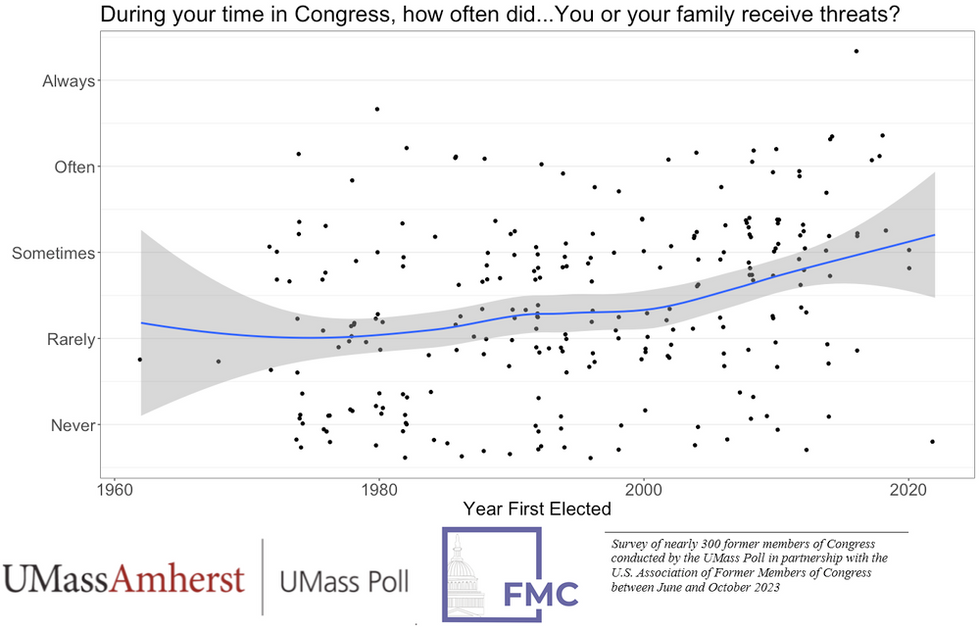Meyers is executive editor of The Fulcrum and president of DBM Content Solutions.
Baseball star Justin Verlander and model Kate Upton likely know that stalkers and threats come with their chosen professions. But the couple are far more famous than most other relatives of politicians, who have witnessed an increase in personal threats in recent years.
That’s one of the takeaways from a new survey conducted by the U.S. Association of Former Members of Congress and the University of Massachusetts Amherst that found retired lawmakers and their families have received threats at an increasing frequency.
Nearly half (47 percent) of retired members of Congress said they or their family members were threatened at least “sometimes,” with numbers significantly higher among women and Black or Latino members (69 percent).
“There is nothing new about people criticizing or disliking certain Members of Congress, but the uptick in violent threats towards our politicians is incredibly disturbing,” said FMC President L.F. Payne, a former Democratic lawmaker from Virginia. “Partisan disagreements should not lead to violence or threats. The results of this survey showcase a need for drastic action.”
Former Rep. Fred Upton, a Michigan Republican, said he received his first threat after voting for the 1994 gun control legislation known as the Brady Bill, and then was targeted again after supporting the assault weapons ban during the Clinton administration. He experienced another surge in threats after voting to impeach former President Donald Trump.
“At the end we were very careful about telegraphing events ahead of time, whether it was a service club or a school,” Upton said. “We just had to be more careful so no one could get a jump on us.”
Upton recounted a particular case in which a man managed to find the lawmaker’s home phone number and would call at 1 or 2 a.m.
“He was convinced that I had broken into his hotel room and stolen his AT&T phone charger, which then prevented him from dating my niece,” Upton said, explaining that Kate Upton and Verlander, now her husband, needed to get police protection.
“They were very fearful,” he said.
And in 2021, after voting in favor of a bipartisan infrastructure bill, Upton received threatening voicemail messages. He played one of the messages on CNN, allowing viewers to hear someone tell Upton: “I hope you die. I hope everybody in your f**king family dies.”
But these anecdotes are just a drop in the bucket. The U.S. Capitol Police conducted 7,501 threat investigations in 2022. While that total is a decrease from a high of 9,626 in 2021, it still represents a 90 percent increase since 2017.
The USCP says members of both parties receive threats at a similar rate, and the FMC-UMass survey bears that out. The poll found that 49 percent of Republicans and 46 percent of Democrats reported receiving threats at least sometimes.
The survey also found that lawmakers elected more recently received threats at a higher frequency.
And it’s not just members of Congress and their families. The survey found that 30 percent of former members reported their staffers had received threats sometimes or frequently, but 45 percent among staffers employed by women and minority lawmakers.
Respondents were also fearful of potential violence more broadly related to the 2024 election: 44 percent said they were very concerned, along with 40 percent who were somewhat concerned, about election-related violence occurring during next year’s presidential election. The fear is stronger among Democrats (94 percent concerned or somewhat concerned) than among GOP, but a significant share of Republicans (74 percent) share that fear.
“While these results are extremely upsetting, it’s exactly why we felt conducting this survey was so important,” said FMC CEO Pete Weichlein. “Political tension in our country is clearly coming to a boiling point, and awareness of these findings may be the first step to combating it.”
Actual violence against lawmakers and their families is rare, but certainly a concern. Most recently:
- In 2011, Rep. Gabby Giffords (D-Ariz.) survived being shot in the head during an event with constituents.
- In 2017, Rep. Steve Scalise (R-La.) was critically wounded during a shooting at a practice for the Congressional Baseball Game. He also survived.
- That same year, Sen. Rand Paul (R-Ky.) was attacked by a neighbor who was angry about a yard dispute.
- In 2022, a man attacked Paul Pelosi, husband of former Speaker Nancy Pelosi (D-Calif.), in their home.
- Earlier this year, Rep. Angie Craig (D-Minn) was assaulted by a man who followed her into her apartment building.
The FMC and UMass-Amherst survey included responses from 293 former House members and senators; 55 percent were Democrats and 45 percent were Republicans.






















Trump & Hegseth gave Mark Kelly a huge 2028 gift